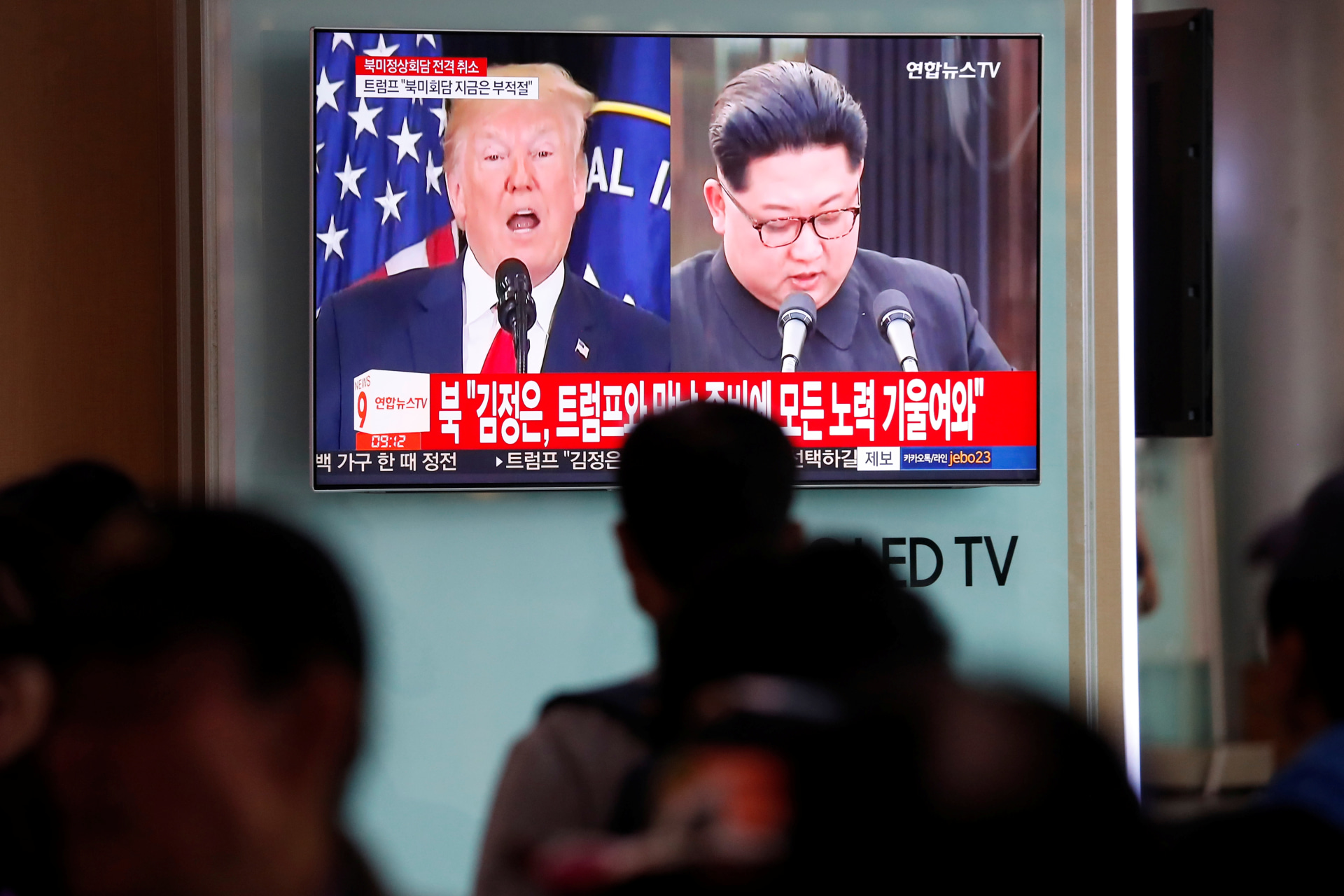Can the Trump-Kim Summit Be Rescheduled?
On Thursday, the White House canceled the highly-anticipated June 12 summit between President Trump and Kim Jong-un. Despite will on all sides for the summit to proceed, a fundamental disagreement on the roadmap to denuclearization looms large.

By experts and staff
- Published
By
- Patricia M. KimStanton Nuclear Security Fellow
- Jeremy FullerResearch Associate, Japan Studies
Yesterday the White House canceled the highly anticipated June 12 summit between President Donald J. Trump and North Korean leader Kim Jong-un. In an open letter, Trump wrote to Kim that, given the “tremendous anger and open hostility displayed” in North Korea’s most recent statement, it was “inappropriate, at this time” for the meeting to take place.
Addressing the latest threat by North Korea to meet in a “nuclear-to-nuclear showdown,” the letter responded in Trumpian fashion that “you talk about your nuclear capabilities, but ours are so massive and powerful that I pray to God they will never have to be used.”
Trump also struck a conciliatory tone at times, thanking Kim for his “time, patience and effort” on the negotiations, and for releasing the three American hostages. And he left open the possibility for rescheduling the summit, urging Kim not to “hesitate to call me or write” if he changed his mind.
A return to threats and belligerence
The cancellation of the summit was not too surprising given the increasingly harsh rhetoric coming from Pyongyang in recent days. Last week, North Korea abruptly canceled an inter-Korean meeting and threatened to pull out of the summit with the United States in response to U.S.-South Korean military exercises. Kim Kye-gwan, North Korea’s first vice-minister of foreign affairs, accused the United States of “trying to drive us into a corner” and declared that North Korea was not interested in “unilateral nuclear abandonment.” If the Panmunjom Declaration gave a glimmer of hope that North Korea had turned a new leaf, these statements were a return to form.
On Wednesday, Choe Son-hui, another North Korean vice minister, called Vice President Mike Pence a “political dummy” for suggesting the United States could apply the “Libya model” to North Korea if talks failed. This latest statement by Choe seems to have been the final straw that pushed the White House to cancel the meeting.
A rescheduled summit?
Despite the sudden pause in the rush toward a summit, all sides will most likely try to reschedule the meeting.
First, President Trump is personally invested in making a deal with Kim and securing a foreign policy win for the White House. Since accepting Kim’s invitation in March, Trump has continually heightened anticipation for the summit, predicting a “very big success” and entertaining South Korean President Moon Jae-in’s remark that he deserves a Nobel Peace Prize.
Kim Jong-un is also unlikely to walk away from this opportunity to negotiate with the United States, after having methodically reached out to Seoul, Beijing, and Washington over the past few months. In fact, Kim Kye-gwan released a statement last night in response to the cancellation, saying North Korea was ready to meet with the United States “at any time.” Kim’s diplomatic outreach has been driven by multiple motives—from seeking relief from the maximum pressure campaign to pursuing a new national strategy of economic development. He has little to gain from a return to the tensions of last year.
Seoul is perhaps the most eager for the meeting to take place. President Moon has worked assiduously to coax Trump and Kim to meet at the negotiating table given the reality that inter-Korean reconciliation, and ultimately peace on the Korean Peninsula, cannot be achieved unless the United States and North Korea strike a deal on denuclearization.
And despite Trump’s speculation that Chinese President Xi Jinping may have encouraged Kim to take a harsher tone in recent weeks, Beijing, too, has a strong interest in the continuation of negotiations between Washington and Pyongyang. While China may have been wary of the pace of diplomatic activity between the two Koreas and Washington in recent weeks, it certainly does not want a return to the tension of the pre-Olympics period when the Trump administration was threatening military strikes on its doorstep, and China had little choice but to play a supporting role in the U.S. pressure campaign.
But despite the will on all sides for the summit to go forward, a fundamental gap exists between the United States’ and North Korea’s respective roadmaps to denuclearization.
While the White House has clearly stated that North Korea must take significant steps toward complete denuclearization in a limited time frame before any sanctions can be relaxed or significant rewards given, Pyongyang has called for a “synchronous” process of disarmament in which gradual steps towards denuclearization are met with concurrent U.S. economic and security concessions. By this logic, Kim Jong-un may feel he has given too much already by declaring a voluntary freeze of nuclear and missile tests, dismantling the nuclear weapons test site at Punggye-ri, and letting the three American detainees go, when the United States has not given anything in return.
Bridging this fundamental gap will be difficult if not impossible. Unless one or both sides align their expectations and rhetoric with this reality, it is unlikely that the summit can be rescheduled.